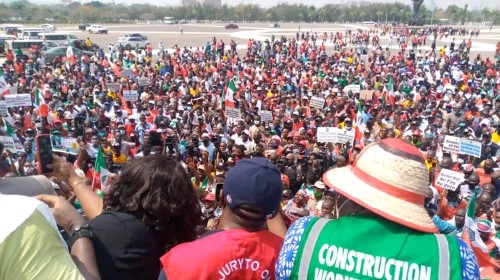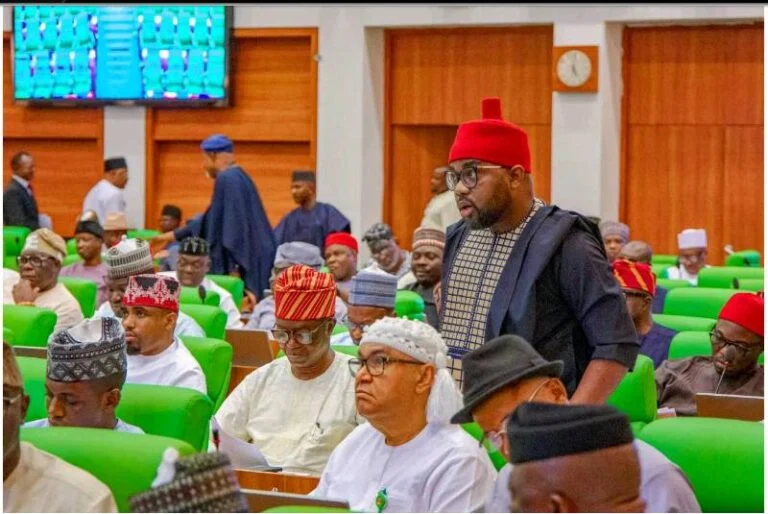- Giving a bag of rice to 12 people, N100m to each lawmaker insulting – Labour
- Government has absconded from negotiation table, fails to meet workers’ demands – NLC
Barely one week after leading a two-day nationwide warning strike, the organised labour on Tuesday threatened to begin an indefinite strike should the Federal Government fail to meet its demands at the end of a 21-day ultimatum which will expire in approximately one week’s time.
The workers union said the proposed strike was necessary following the failure of the Federal Government to provide palliatives to assuage the Nigerians hardships as a result of the fuel subsidy removal.
The Nigeria Labour Congress said the industrial action which may commence any day from next week would lead to an indefinite shutdown of commercial and economic activities across the country.
According to The Punch, the National Assistant General Secretary of the NLC, Mr Christopher Onyeka, on Tuesday, said the FG was wrong to share a bag of rice to a dozen citizens while reportedly giving N100m palliative to each member of the National Assembly.
The union had on September 1 handed down a 21-day ultimatum to the FG over the delay in sharing of palliatives, saying it might be compelled to declare an indefinite labour action if its demands were not met.
“If the government fails to provide the appropriate responses to our demands, we encourage you to maintain your steadfast resolve. The same passion and determination that fuelled this warning strike will be crucial if we find ourselves compelled to embark on an indefinite nationwide strike,’’ the labour body said in a letter to the FG.
To demonstrate its seriousness, the NLC mobilised workers for a two-day warning strike on September 5 and 6, partially grounding social and economic activities in several states with banks, ministries, agencies and departments closed to the public in some states.
The NLC leadership had said the action was in preparation for a total shutdown which would start at the expiration of the ultimatum next week.
Among other demands, the NLC and the Trade Union Congress were asking for wage awards, implementation of palliatives, tax exemptions and allowances to the public sector workers and a review of the minimum wage.
Though the FG made a commitment to restructure the framework for engagement with organised Labour on palliatives, the eight-week timeframe set for the conclusion of the process expired in August with no action whatsoever.
The committees were given eight weeks to conclude their assignment and hasten the implementation of the framework in cushioning the effect of petrol subsidy removal on Nigerians but weeks after the timeframe expired, the sub-committees had yet to meet or actualise their mandates.
President Bola Tinubu had since June 19 set up the Presidential Steering Committee and various sub-committees to discuss the framework to be adopted on the palliatives.
The sub-committees had been created to implement FG’s palliative package in areas such as Cash Transfers, Social Investment Programme, Cost of Governance, Energy, and Mass Transit and Housing.
This was a fall-out of the President’s closed-door session with the leadership of the NLC and the TUC during a nationwide protest by the organised labour.
Nationwide Protest
Giving an update on the planned walk out following the lukewarm attitude of the government, Onyeka insisted that the FG had absconded from the negotiation table, noting that it had also failed to meet the workers’ demands.
The union leader hinted that the strike would not notify the government before carrying out any action it deems fit.
He said, “We sent the letter to the Federal Government on September 1, 2023, so by September 22, 2023, the 21-day ultimatum will end.
“We have made it clear that the Federal Government has abandoned and absconded from the table for negotiation; that government is no longer negotiating with Nigerians and there is no good faith negotiation that is going on.’’
“President Bola Tinubu promised Nigerians on his own on the television with the President of NLC, Joe Ajaero, that he was going to restructure the committees, but he did not do that, and since then the committees have not met and there has been no negotiation that is on-going. As it is, NLC is not negotiating with the government,” Onyeka said.
The Assistant General Secretary said Nigerians were insulted by the inadequate palliative being given.
He lamented, “Can you see the insult that a ward would share a bag of rice and the government calls that a palliative? It is an insult to Nigerians, whereas the government gave legislators N70bn and each of the legislators gets over N100m in a country where Nigerians are suffering.
“The FG is buying cars and houses of over N100m for each person and Nigerians are keeping quiet as if what is going on is a normal thing. NLC calls Nigerians to join hands together because they cannot do it alone.
‘’When NLC calls for action, people should come out, they should because it is a collective effort to make the government yield to the desires and the interest of Nigerians.”
Workers who spoke to our correspondents said they have been badly affected by the withdrawal of the fuel subsidy, urging the government to quickly cushion the pains.
In order to beat the harsh economic situation, civil servants said they have been devising various survival strategies, including skipping work as well as engaging in farming and trading to augment their incomes.
Some workers in the Federal Capital Territory, Abuja and Lagos revealed that their organisations have reduced the number of work hours and days.
They further noted that their organisations had also adopted the work-from-home model which became popular during the lockdown period following the COVID-19 pandemic in 2020.
An Abuja-based civil servant, Judith Obiora said, “Most of the offices at the Federal Secretariat are no longer filled up as they used to be before the fuel subsidy removal. Now, we only come to the office twice or thrice a week.”
A civil servant who is planning to relocate abroad said he could no longer cope with the high cost of living.
He said, “The situation in Nigeria is very terrible because the minimum wage no longer meets the cost of living. Civil servants are suffering because the prices of things have increased, and it is tough to cope these days.
“By the time you weigh everything, you will see that it is not worth it. Even as a businessman in this country, getting customers to patronise you is difficult, and getting your profit from the work you are doing is hard.”
A worker, who identified himself as Friday, said he had been going to work three times a week to cut costs.
He said, “It has greatly affected me because I can’t afford to go to work Monday through Friday anymore. I go three times a week. Even if the directors have their ways, they won’t show up.
“The effect of the subsidy removal is general. The bus provided for my area is an 18-seater bus but we have over 50 staff living in Kuje, and the senior staff always get preference over the junior staff.
‘’The junior staff members are left behind. I don’t even try boarding the bus because I don’t want any senior staff member to talk to me anyhow (disrespectfully).”
Hard Times
A staff member of a prominent agency who wished to be known as Vivian stated, “It has been tough, especially in the area of feeding. Things are very expensive, and for people like us who still have young children, it has been quite difficult meeting up.
“If it is an adult, you can still manage, but how do you tell a child that the money is not enough? Also, in the area of transportation, it has been very difficult. For instance, the transport fare that used to be N100 before has jumped to N300, and when you calculate it, you will find out that the easiest thing to do is to work remotely once in a while.”
A civil servant who identified herself as Sade said she and her husband had been having sleepless nights over the survival of their family.
She lamented, “I was at the market yesterday, and I screamed. Things are too expensive. Honestly, we can’t continue like this. Apart from the high food prices, the school fees of my children have increased, and my husband and I have been having sleepless nights trying to manage ourselves.”
One Mr Kunle Adams, who worked with a federal agency, said he had been forced to become a cab driver in order to generate extra income.
He noted, “I usually do not like to pick passengers when going to work, but I have been doing it to cover the amount I spent on fuel. I once tried parking my car at home, but it was not convenient for me to do so; otherwise, I would have dropped it because it is cost-effective.
‘’If you are talking about high prices of commodities, that is everywhere, so who am I not to be affected? If only the government could intervene, it would be lovely.’’
Lamenting the situation, Ade Abayomi, a Lagos-based civil servant said, “It’s not been easy since the subsidy removal was announced. But I think the government has been reasonable too. I only go to work about thrice in a week these days.”
Hassan Ahmed, who works with a federal parastatal in Abuja, admitted that he works remotely and only visits the office occasionally.
“The cash crunch is affecting everyone, including government organisations and private companies and individuals. Most of us now work from home. I only go to the office occasionally now,” he disclosed.
The Ekiti State NLC Chairman, Kolapo Olatunde, declared that the workers were working under harsh conditions since the Federal Government removed the fuel subsidy.
Olatunde, who said the fuel subsidy removal had led to an increase in the prices of goods and services, justified the need for salary increment.
“If you must fill your car tank now with petrol, you must have over N35,000 and that won’t serve you for two weeks. It means you have to fill your tank twice amounting to N70,000 to take you for four weeks.
‘’If you are a civil servant from whichever level to grade level 14, I am not sure the salary is up to that on a monthly basis. The equation is not balanced, that is the truth. That is why the government should have a listening ear,” Olatunde said.
The NLC leader, who said reducing the working days was not the solution, noted, “The solution is to give workers what is required of them to do their work effectively so that at the end of the day, there will be a positive plough-back.
“If you go to the office to solve problems, someone is now saying don’t come to the office twice or thrice in a week, who solves the problems of those days? It means that the office is not doing anything. It means we are deceiving ourselves. ‘’
“Then, what becomes of the unemployed if you are asking the employed people to stay at home? Definitely, that is a brighter picture that people will no longer be employed,” he concluded.
Kwara Workers
In Kwara State, workers go to their offices three times a week in order to save money in view of the high cost of petrol.
The state government had earlier directed the workers to report for work three times and added N10,000 to their salaries pending the review of the minimum wage.
A female civil servant simply identified as Lola, explained that since the fuel subsidy was removed, she had been going to work thrice a week.
‘’Workers in my office agreed that we should be reporting in the office three times a week. We have agreed on which days to come to the office since the government said that we should come to work for three days in a week,’’ she noted.
She complained about the high cost of transportation which she said had increased by 200 percent.
‘’I have been reporting for work on Tuesday, Wednesday and Friday while others also selected other days of the week when they come to the office. In my house, we have also reduced the quantity of food we eat. We only eat in the morning and evening.
‘’On days that I don’t go to work, I supplement the feeding of my two children with garri in the afternoon if they complain of hunger as they are presently on holiday,” Lola stated.
A worker in the governor’s office, Mallam Makun Abdullahi, revealed that he had stopped bulk purchase of foodstuffs from the cooperative society as he used to do on a monthly basis.
“Though the government has added N10,000 to our monthly salary, it cannot take us anywhere. Our salary is no longer enough to feed our family. I am also involved in farming where I go on days I don’t go to work.”
Public workers in Sokoto State explained that many of them do not come to the office every day in order to save money on transportation.
Some of the civil servants in the state who spoke with our correspondent confirmed that the arrangement in most cases was among the junior staff without the knowledge of their boss.
A state worker said, “We have some arrangements among ourselves to deal with the situation even though it’s without the knowledge of the management but we cover for ourselves.
“Most of us use the spare time for farming as part of our own little way to tackle the current hardship.”
The Sokoto State NLC Chairman, Abdullahi Aliyu, and his secretary, Hamisu Yanduna, were unavailable for comment.
Credit: The Punch

 BIG STORY3 days ago
BIG STORY3 days ago
 BIG STORY3 days ago
BIG STORY3 days ago
 BIG STORY2 days ago
BIG STORY2 days ago
 BIG STORY1 day ago
BIG STORY1 day ago
 BIG STORY3 days ago
BIG STORY3 days ago
 BIG STORY3 days ago
BIG STORY3 days ago
 BIG STORY4 days ago
BIG STORY4 days ago
 BIG STORY5 days ago
BIG STORY5 days ago






















